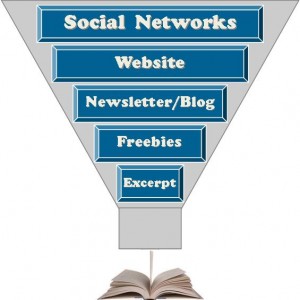 How are readers going to find you? When agents and publishers consider a book project, especially nonfiction, they ask questions about your discoverability. There are two basic ways authors and their books get found by readers: search or referral. The first method requires you master search engine optimization and the second requires you master social networking. The marriage of the two in social media marketing is why you can’t afford to ignore the issue of your strategy as an author.
How are readers going to find you? When agents and publishers consider a book project, especially nonfiction, they ask questions about your discoverability. There are two basic ways authors and their books get found by readers: search or referral. The first method requires you master search engine optimization and the second requires you master social networking. The marriage of the two in social media marketing is why you can’t afford to ignore the issue of your strategy as an author.
If your answer to the discoverability question is satisfying, then their second question to an aspiring author is what actions do readers take when they find you? The conversion question is key. Does your writing pull readers to your online real estate? Will you be able to attract book-buying customers?
Many writers resist cultivating relationships with readers at the expense of their professional writing career. Before an author is offered a publishing contract with an advance these days they have to deliver book-buying readers to the doorstep of the publisher with their audience platform.
Publishing, after all, is a business. I’m not talking about hawking your book on every social media platform in a style similar to a used car salesman, although we’ve all seen that done. And we all know it doesn’t work. So here’s what an author needs to understand about the role they play in selling books.
Authors create book-buying readers for their project through audience engagement. Sometimes this is created entirely online and sometimes it starts face-to-face. Maybe your readers are members of a professional organization to which you belong, or subscribers to the magazine where you have sold your writing as a free-lance writer, former students or clients, or listeners to your weekly radio program. Cultivating a relationship with your readers so they will want to purchase your book makes you the most important member of your advance sales team.
Dear author, meet the sales funnel.
 In order to be effective as an author, you need to participate in bringing readers into the sales funnel. Think of your circle of social networks as the top of the sales funnel. Everyone you know will soon know you have a forthcoming book, if you’re smart. And everyone you meet will learn about it, too.
In order to be effective as an author, you need to participate in bringing readers into the sales funnel. Think of your circle of social networks as the top of the sales funnel. Everyone you know will soon know you have a forthcoming book, if you’re smart. And everyone you meet will learn about it, too.
Bringing those who are interested in you and your book project into the sales funnel begins when you invite readers to your website. In marketing language, the ‘landing page’ is step one. Here an author establishes brand identity. The author is the brand and the book is the product. So the name of your website should be your author name, not the working title for the book. On the landing page you want a ‘call to action.’
Sales and marketing lingo can put off many authors, but it is imperative to understand the processes of marketing if you hope to sell your books. A ‘call to action’ on the home page of your website asks the visitor to opt in to learn more. The action pulls visitors into the vortex of the sales funnel as it begins to narrow a little. There are many ways you can call your readers to action. Having a Contact button in which the reader can reach you is an obvious ‘call to action.’ A sign-up for email newsletter to let the reader know when the book becomes available is an important method of creating audience engagement. Writing a blog and offering email subscriptions is another. Offer buttons to connect with your spots on Facebook, Twitter, LinkedIn, Google +, Tumblr, Instagram, or Pinterest.
Pulling readers deeper into the sales funnel involves offering free content at the top of the funnel and premium value as you move toward the bottom of the funnel, the book.  The calls to action pull a reader deeper into your website and more invested in reading more premium content. More such calls to action include giveaways or freebies like downloads or webinars which require an increasing investment in the premium content of your book.
The calls to action pull a reader deeper into your website and more invested in reading more premium content. More such calls to action include giveaways or freebies like downloads or webinars which require an increasing investment in the premium content of your book.
You need a brand, a genuine public persona, and a commitment to public and civil discourse. The author’s role is to engage authentically with readers. Your professionalism sells books.
Do you need to develop a strategy for your social media marketing? Contact us for a consultation.

Great tips. Valuable information. I always learn so much from you Jill.